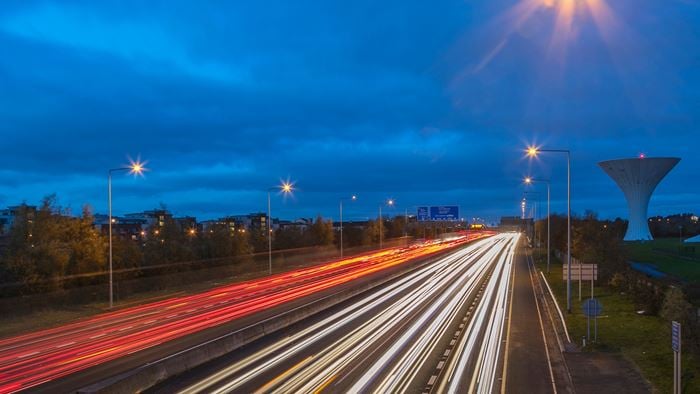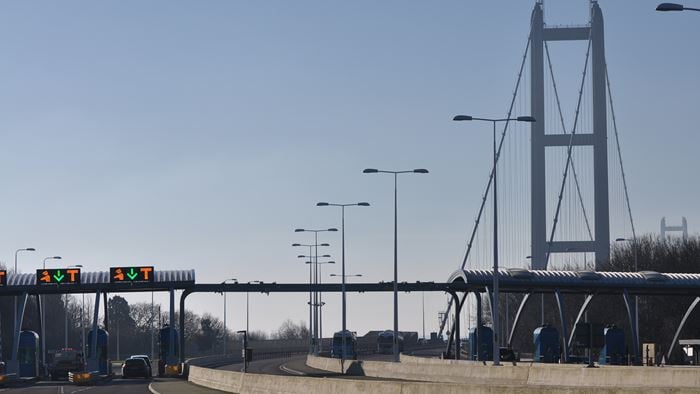Like everything else around us, toll schemes are undergoing a digital transformation, moving from infrastructure-heavy fixed point tolling systems towards more responsive and data-driven free-flow systems.
As the first European country to implement barrier-free tolling for all vehicle classes, Ireland is at the forefront of tolling innovation. The country’s roads and light rail agency, TII (Transport Infrastructure Ireland), has led the pack in deploying state-of-the-art technology to improve journey times and safety for road users.
One of Ireland’s busiest roads, Dublin’s M50 free-flow orbital motorway processes approximately 53 million vehicles annually. Since 2014, our consultants and engineers have been working as the Authority’s Representative on the development of eFlow, the barrier-free toll. TII appointed Arup to implement an Operational Management Services team to ensure that eFlow deliver best-in-class services. As part of this, we work with TII and the eFlow operator, emovis, to optimise governance, risk and compliance (GRC), information and cybersecurity and enforcement management of the eFlow operation.
Arup has a strong working relationship with TII, working together with the agency as a trusted adviser on tolling strategy, including operational, governance and procurement management, as well as on the technical evolution and management of tolling schemes.
Collaboration: key to designing governance, risk and compliance framework
Implementing governance structures to manage compliance and risk ensures that tolling operations are delivered in a secure manner. Arup has helped TII to proactively manage risks and enhance tolling governance and regulatory oversight. Our Operational Management Services team worked with TII and tolling operator, emovis, to develop a collaborative governance, risk and compliance (GRC) management framework for eFlow to direct and control the operation. Developed in line with ISO 37500 on outsourcing best practice, the GRC framework provides guidelines to manage risks, reduce uncertainty and ensure that all operations comply with the relevant regulations.
“The close collaborative relationship between TII, emovis, Arup and all other stakeholders is key to managing change and implementing improvements in tolling operations. ”
Dermot MacEvilly Associate Director Talk to Dermot
By combining our management consultancy, project management, transport and intelligent transport systems (ITS) expertise, Arup is also providing operational assurance and oversight for all eFlow tolling activities. Key to this is ensuring compliance with TII corporate policies, wider public-sector compliance obligations and relevant Irish/European statutory obligations.
Our engineers and consultants worked with TII to develop a risk register, capturing the key risks related to enforcement, compliance, customer care, changes in national or EU regulations, eFlow operational issues and significant risks identified during audits and compliance certification. We developed a GRC audit schedule to ensure compliance, including ongoing tracking at monthly monitoring meetings with TII and emovis and an online interactive business continuity assurance dashboard.
Protecting against cyber risk
Cybersecurity is a key concern for any transport or tolling service. To enable TII to manage cyber risks, Arup’s Operational Management Services team advised and provided oversight on controls against attacks or breaches and defined a compliant information security strategy. Arup’s cybersecurity service is focused on assessing risks, advising on mitigation plans and the protection of the eFlow computer infrastructure, website and smartphone app.
Having business continuity processes in place to ensure that normal operations can continue in the event of an information security incident is a vital element of Arup’s service. Our consultants advised and provided oversight on an information security incident management and response procedure including a crisis management plan. This includes practical plans for business continuity, to ensure resilience of IT systems during incidents or disasters.
Increasing awareness of the steps to follow to pay tolls is vitally important.
Information campaigns: increasing customer awareness of toll roads
While on some free-flow systems, it is compulsory to be a registered customer, on many other systems, including eFlow, a portion of customers are unregistered and there is a reliance on voluntary toll payments.
Enforcement management is essential following non-payment of tolls by both registered and unregistered customers.
Due to the voluntary nature of free-flow tolling, most enforcement proceedings are generated by unregistered customers, so increasing awareness of the steps to follow to pay tolls is vitally important. This helps to protect people from the consequences of prosecution, particularly drivers who are unfamiliar with using free-flow tolls.
Our Operational Management Services team advises TII on the latest enforcement trends in tolling and other sectors and provides project management services for ongoing reviews of the eFlow enforcement programme.
As enforcement involves altering driver behaviour, public information campaigns are a vital element of improving compliance. Arup supports TII in the provision of these campaigns across various digital channels (including radio, web and social media) and more traditional media channels (including newspapers and posters) to enhance awareness of eFlow and to increase driver compliance with paying tolls on the M50 free-flow tolling operation.
Our team also helped to enhance the usability of the eFlow website, making it easier for customers to solve doubts and queries and arrange payments. Payment flexibility is key, with a variety of toll payment options available – online payments, call centre, retail and kiosks at car rental and ferry locations. Online self-service through the website and the QuickPay app provides customers with an easy method to view and pay tolls and penalties, hence improving payment compliance.
 ;
;





